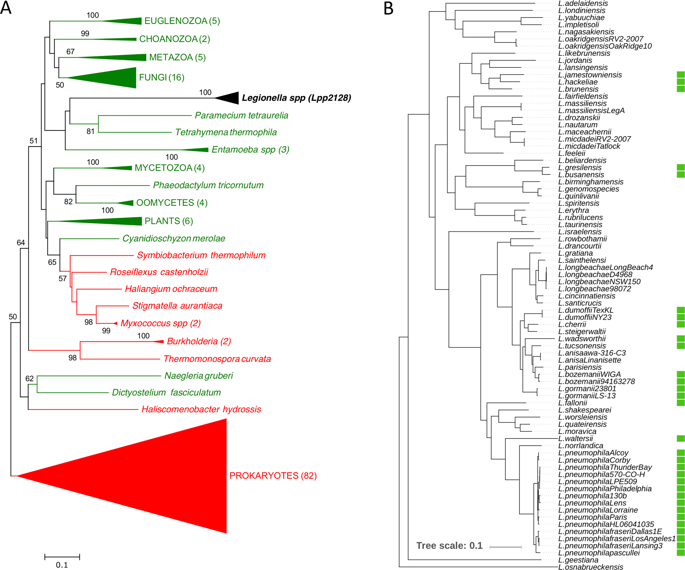Genes and Immunity ( IF 5.0 ) Pub Date : 2019-05-04 , DOI: 10.1038/s41435-019-0074-z Laura Gomez-Valero 1 , Carmen Buchrieser 1

|
Legionella pneumophila is an intracellular pathogen that causes a severe pneumonia called Legionnaires’ disease that is often fatal when not promptly diagnosed and treated. However, L. pneumophila is mainly an environmental pathogen of protozoa. This bacterium parasitizes free-living amoeba and other aquatic protozoa with which it co-evolved over an evolutionary long time. Due to the close relationship between hosts and pathogens, their co-evolution leads to molecular interactions such as the exchange of genetic material through horizontal gene transfer (HGT). Those genes that confer an advantage to the bacteria were fixed in their genomes and help these pathogens to subvert host functions to their advantage. Genome sequencing of L. pneumophila and recently of the entire genus Legionella that comprises over 60 species revealed that Legionellae have co-opted genes and thus cellular functions from their eukaryotic hosts to a surprisingly high extent never observed before for an prokaryotic organism. Acquisition and loss of these eukaryotic-like genes and eukaryotic domains is an ongoing process underlining the highly dynamic nature of the Legionella genomes. Although the large amount and diversity of HGT that occurred between Legionella and their protozoan hosts seems to be unique in the prokaryotic world, the analyses of more and more genomes from environmental organisms and symbionts of amoeba revealed that such genetic exchanges occur among all amoeba-associated bacteria and also among the different microorganisms that infect amoeba such as viruses. This dynamic reshuffling and gene-acquisition has led to the emergence of major human pathogens such as Legionella and may lead to the emergence of new human pathogens from the environment.
中文翻译:

细胞内寄生虫病,肺炎军团菌和军团菌属进化的驱动力
嗜肺军团菌是一种细胞内病原体,会导致一种称为军团菌病的严重肺炎,如果不及时诊断和治疗,通常会致命。然而,嗜肺乳杆菌主要是原生动物的环境病原体。该细菌寄生了自由生存的变形虫和其他水生原生动物,并与之共同进化了很长时间。由于宿主和病原体之间的密切关系,它们的共同进化导致分子相互作用,例如通过水平基因转移(HGT)交换遗传物质。那些赋予细菌优势的基因被固定在它们的基因组中,并帮助这些病原体颠覆宿主的功能。嗜肺乳杆菌的基因组测序最近,包括60多个物种在内的整个军团菌属发现,军团菌具有共同选择的基因,因此其真核宿主的细胞功能达到了以前从未发现过的令人惊讶的高度。这些真核样基因和真核域的获取和丢失是一个持续进行的过程,突显了军团菌基因组的高度动态性。尽管军团菌之间发生了大量的HGT而且它们的原生动物宿主在原核世界中似乎是独一无二的,对越来越多的环境生物和变形虫共生体的基因组进行分析后发现,这种遗传交换发生在所有变形虫相关细菌之间以及感染变形虫的不同微生物之间,例如病毒。这种动态的改组和基因获取已导致主要人类病原体(如军团菌)的出现,并可能导致环境中新人类病原体的出现。











































 京公网安备 11010802027423号
京公网安备 11010802027423号